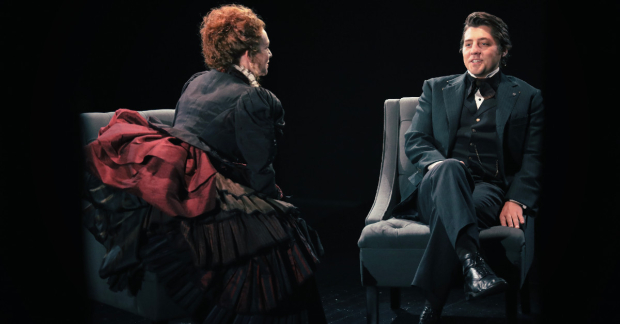Review: A Woman Fights the Patriarchy and Wins (Sort Of) in Washington Square

(© Pavel Antonov)
The Axis Theatre, where a new adaptation of Henry James's 1880 novella Washington Square is now running, is only a short walk from Washington Square Park. Once a potter's field, the area was transformed by the 1830s into one of the most fashionable neighborhoods in New York City, and with the money came all the restrictive societal customs that kept women tethered to husbands and locked in a state financial dependence and obedience. In his novel, James tells the story of a woman, Catherine Sloper, who refuses to yield to Washington Square's pressures of wealth and male-dominated privilege, and manages, just barely, to slip out from under the thumbs of the two men who want to control her.
Director Randy Sharp has done an exquisite job of adapting this tale of repression and quiet rebellion for the Axis stage in a lean 85-minute play that stays true to the book, and even, I dare say, makes an improvement or two along the way. The production's four-member cast bring their A-game to the material with humor and fine-tuned performances, and though it takes place on a small stage with an almost empty set, by the end it feels as though we have seen something larger than the theater's modest trappings would suggest.
Those who have seen the 1947 stage play The Heiress or its subsequent film adaptation (both based on James's novel) will recognize the plot. Catherine (Britt Genelin) does not have much to recommend her to a prospective husband. Just "passable" in looks according to her proud, dismissive doctor-father (George Demas), she is neither very clever nor accomplished, with only a moderate talent for needlework. She does, however, have ten thousand a year left to her by her deceased mother (that small fortune is hers to do with as she likes) and another twenty thousand a year awaiting her upon her father's demise.

(© Regina Betancourt)
The prospect of a wealthy wife is enough to attract the attention of the profligate gold digger Morris Townsend (Jon McCormick), who woos the naïve Catherine with sweet nothings and promises of undying love. But papa is on to Townsend's scheme and forbids the match, unlike Catherine's romantic-minded aunt, Mrs. Penniman (Dee Pelletier), who is simply over the moon for handsome Morris. As the men do battle and Penniman does all she can to get the two lovebirds hitched, Catherine must figure out how to assert herself and direct the course of her own life.
Genelin shows us how Catherine does this by adroitly transforming from doe-eyed dupe to worldly realist as we watch her gaze narrow and her smile fade while the invisible years pass. Demas dominates the stage with his blustering performance as the doctor, cutting the air with ironic gestures as the father attempts to whittle down his daughter's resolve with his cruel words. Pelletier gets many of the show's best laughs as the busybody matchmaker, who could have stepped right out of a Jane Austen novel with her exaggerated sighs and faraway looks at love in the distance. And McCormick nails his performance as the unctuous Townsend, every smile hiding a different meaning, every whisper a secret conspiracy.
Sharp keeps things simple in this production, with only two upholstered chairs serving as set, but we know that we are in the late 19th century from Karl Ruckdeschel's costumes, featuring surprisingly rich-looking dresses for Catherine and Mrs. Penniman. David Zeffren's lighting design bathes the stage in the shadows of the past but also functions to highlight important moments in Catherine's evolution, as when she stands illuminated looking into an unseen mirror and we gather from her expression what she sees — and what she doesn't. It's a moment that Sharp returns to at the end, with a subtle and effective tweak to James's ending. The play's action is at times accentuated by music composed by former Blondie guitarist Paul Carbonara, though the ethereal sounds have a Twin Peaks-ish vibe that temporarily pulls us out of the Jamesian setting. That quibble aside, Sharp has fashioned a gem of a play that may seem to some more present than past.











